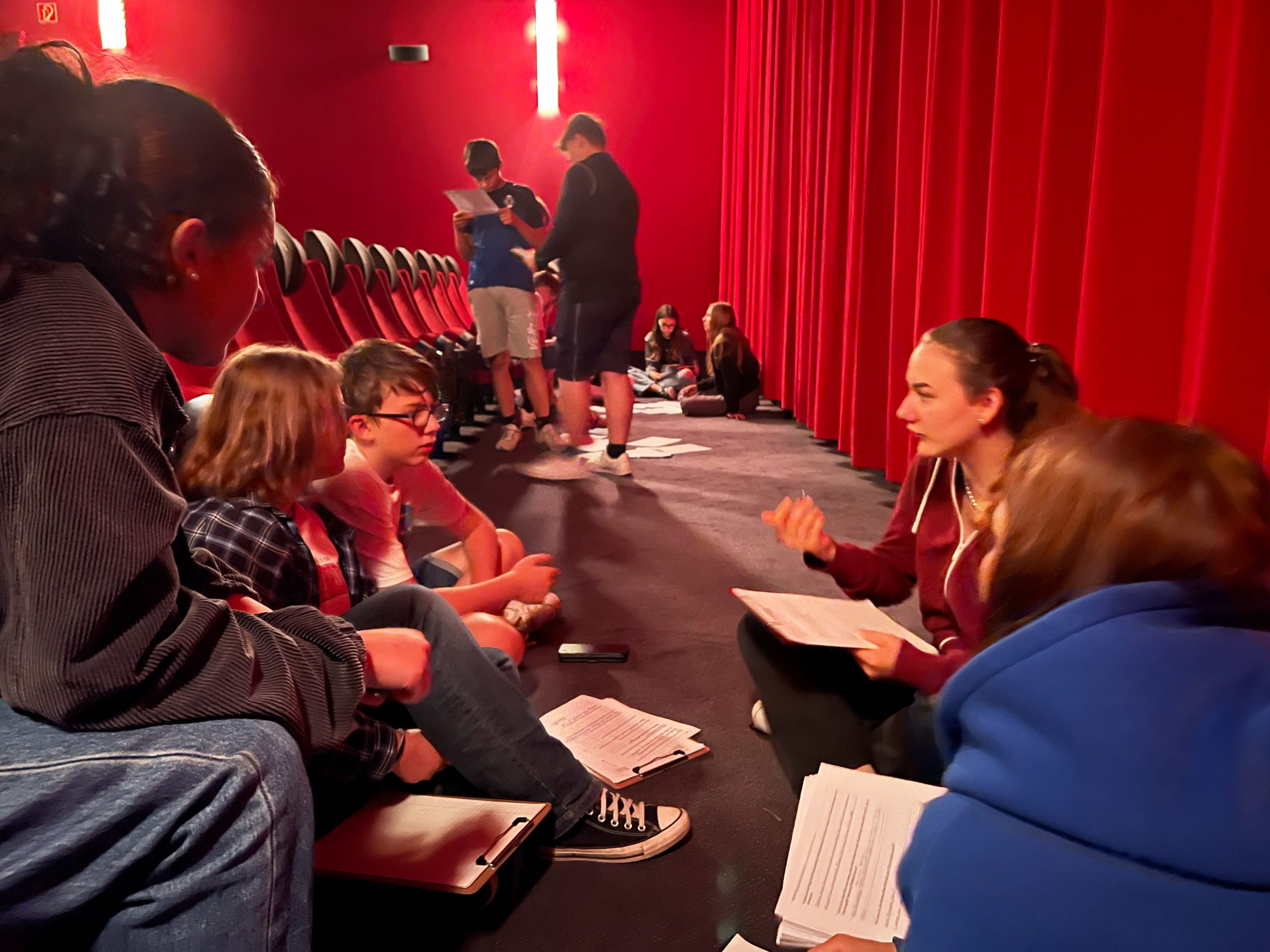Mary L. Gray is an American anthropologist and author who teaches at the Berkman Klein Center for Internet and Society at Harvard University in Boston and is a senior principal researcher at Microsoft Research. In 2020, she received the MacArthur Genius Grant in recognition of her research examining how work, identity, and human rights are being transformed by the digital economy. In their book “Ghost Work,” Mary L. Gray and Siddharth Suri describe how automation is creating a new proletariat. In their view, it steps in whenever the algorithms fail. The core problem is that ghost work does not enter the public consciousness and therefore cannot be politicized. Because ghost workers are not seen.
By Tamara Gajić
Human as a service, will this form of work be our normality in the future?
So it’s an interesting question because I think in many ways we forget how much humans offering their services are so much a part of our present and past when it comes to to labor and work. So when we think about employment, if we think about the construction worker or the the cab driver, we can see that person operating a machine or building something. In all cases, they’re offering more than than their manual labor, particularly in what are called the service economies. Most of what someone is offering is their availability, their care. That’s particularly true in health. So I think it’s important for us to see that it’s not new that humans are offering their services. What’s different is that now it’s even harder for someone to appreciate how many people are participating and facilitating something that we’re benefiting from as a consumer or another business.
When we talk about the gig workers, there are fundamentally bad working conditions in this area. The ghost workers are underpaid, under insured and not organized in any union. Does this also have to do with the role played by the origin and identity of these people?
That’s I mean, it’s such an important question to link to the prior point that you were raising that we tend to think about service work in very specific terms. And I think for all of us the challenges to be able to see that the future of work is often creative work, knowledge, the kind of work that can’t readily be done by automation or machines. So we’ll see increasingly more and more service work, work in which we’re in service to each other. To your question, it’s also true that most of our attention, when it comes to thinking about the labor conditions of work, have focused on the factory floor. Most of our way of organizing for workers rights have assumed three things: There’s a single employer, there’s one work site, and there’s some sort of professional identity that helps somebody orient to who is a coworker and how to form solidarity. The challenge for the future is to recognize we’re going to need new approaches to how we organize and provide the basics of a decent work site. When there isn’t a single place that people are working, when they’re working out of their homes, they’re working from laptops, they’re working from their mobile phones. That doesn’t mean they’re less important. And in fact, if anything, it means we’re all more likely to be part of this approach to work, which is much more task based than full time employment organized.
The gig workers and we are still acting as autonomous actors in this digitized world of work. Is this new world of work still our world?
I was thinking about this that often what feels so alienating about work is when we don’t have a way to choose what we’re doing, how we’re doing it, who we’re working with. And the interesting thing about the rise of contract labor gig work is that it reflects what’s not working in formal economies. So in many formal employment relationships, particularly in the US and other parts of the world, less so in Germany or other parts of the EU, many workers don’t have the kinds of choices that we associate with a good work environment. That’s true. I think it’s heartbreaking. But the challenge is how would we make that different in other parts of the world where there’s really not established formal employment relationships. So, for example, studying India and the United States for the research I’ve done, being able to see what does work look like around the globe presents us with the question of how do we want to recreate the decent work, the decent job for everyone and not think of it as only a national project. That’s that’s quite challenging. But it’s critical to think about the global need here because so much of the service work, the gig work that is managed by systems of computers, AI (Artificial intelligence) will connect us globally. It won’t be that we’re just in one place. It’s going to depend on semiconductors from another country, running the computers that run the servers, that dish up all the work that we’re doing.
The capitalism in this business and this data thing is driving the alienation of people from work as observed by Karl Marx in the first industrial revolution, as you know, to an extreme, because the crowd workers often don’t even know why they mark roads or race in videos, for example. What does it mean for the further development of the mankind? Are people now working for machines or not?
I think it will be up to us to be able to interrupt what is right now a rush toward automation that ironically can’t see where it’s going to fail, and then how many more people will have to be brought in to close the loop or the gap between what computation can do and what people can do. So the deep paradox, we call this the paradox of the last mile of automation. The paradox here is that even as we strive to get people out of work and quite literally, it is because, as Marx observed, it’s the the place to squeeze more capital, to extract more value as to reduce the costs of a worker. As alienating as that is, when you move that to trying to have algorithmic management or algorithmic replacement of workers. What most of technology doesn’t realize is, is that people are irreplaceable in service work. What is it that people bring to the table? They bring their capacity to spontaneously react to a need. That’s irreplaceable. We can chase that with automation, but we will always fall short. We’ll keep trying to figure out how to do what any care worker can do in a hospital when they’re just looking into someone’s eyes and sharing some concern or empathy. But as long as we as humans want human contact, humans will be needed for service work. So let me come at the question you asked a little bit differently, which is to say Marx’s analysis hinged on an alienation of a person’s creativity, their contribution to what was mass produced, a real distancing from that production. What’s different about this world of organized labor happening through contract work, delivered through platforms, through gig work that’s been automated semi-automated is that we retain we can’t let go of making meaning out of what we’re doing. So even in our research, even as people were labeling things and had no idea why they might be labeling the specific images, they absolutely resisted that alienation. I think Marx analysis was top down. And in many ways, if you take an ethnographic approach, you see how resistant the human spirit is to that alienation. It doesn’t mean it’s not being pushed on us, but we have a lot of capacity, particularly right now, to push against that and say no matter whether I know what I’m doing or not, what is it that should be my right as a worker participating in creating something that no computational system can create?
Well, it’s not so long time ago when we were used to work in a team together, we talked to each other, we had meetings, we could discuss eye to eye. But now in this so-called gig economy, it’s not possible anymore. And that’s weaken your bargaining power. Can one really classify the Home Office as a positive development?
I don’t think it’s positive at this point. Although I will say what we noticed as diverse as the the population of people do this work as diverse as it is. We met stay at home parents who had new children. We met elderly people who had retired, who still wanted to contribute. We met people who economically needed an additional stream of income to make ends meet. That full range of who’s participating, they’re all necessary to a labor market that’s oriented around not redundancy, but abundance. In many ways, these labor markets, these gig economies run on many people being available to provide a service to answer a request at any moment. So what we currently are not paying for it’s the availability of people when they’re in their homes, if they’re able to work from their homes, the benefit to them is that they can do three things control their schedule, control perhaps what they work on, and I’ll come back to that and they can control who they work with. And to your point, it on the surface seems incredibly alienating, again, to be isolated in your home, working without any social connection with people. But not surprisingly, in our research, it was so clear that people do reach out to others. They go online, they go on social media, they text with each other, they sit with each other and Skype calls. So people, again, are incredibly resistant to giving up the thing that we all get from work, which is a social connection. It is where we end up spending many hours of the day. So not surprisingly, the thing that workers noted as the pivot point for them to make this something bearable and in many ways to be able to cultivate this as something meaningful hinged on connecting with other people doing this work. They mentor each other. They wish each other happy birthday. They send each other equipment when their equipment breaks down. So we should all know this isn’t inherently about disconnecting people. It’s what are we going to expect and regulate around, importantly, fostering people’s ability to connect. It should never be illegal for workers to talk with each other. That should never be registering as some threat to business. It benefits all of us when people are connected at work.
Companies transforming their economy have shown that they will not take care of their workers unless they are legally required to do so. Why is there no commitment on the part of politicians? To what extent could better transparency, especially with regard to lobbying help?
This is so difficult and I think it’s disorienting to think about how exceptional work conditions are in the European Union, you have such a tradition of workers being at the table to set the conditions of their work. So the negotiation with management with employers is so radically different from what it looks like around the world, including the United States. So when I say this, I take it with the perspective of what does the rest of the working world look like? Because it really doesn’t look like what you have. And in most of this world, that’s very basically regulated, there hasn’t been a moment where we’ve contended with what are fundamental rights as a person who might be entering the working world. What does every working adult need to enter the workforce? Unfortunately, the answer to that question in the United States is whatever your employer will provide and in an environment that is set the tone and the positioning of gig work, because the tech industry has effectively made gig work possible around the world. It’s structuring informal economies that had no employment relationships. Now it’s a consumer on their phone contacting somebody to come get them food. Even as we see the company, the platform providing that connection, there isn’t a framework to see that company. That’s the platform giving the consumer the connection as the employer of record. That’s our biggest problem right now: Who is the employer of record responsible for the work conditions of a gig worker? I actually think it’s important not to assume we know the answer to that question so that we can convene and decide what do we want those work conditions to be for everyone? That’s our biggest challenge right now. So I would argue consumers are a part of that employment relationship. So what are consumers responsibilities to the work conditions of gig workers? Sectors are more likely the responsible parties, the sectors, the industries that benefit from this labour pool that’s available, this commons, they are collectively benefiting from workers who often work for multiple platforms, work for multiple businesses. So it’s not uncommon for someone to be it’s more obvious when a worker is working for Lyft and Uber or Deliveroo. That means that those employers, those those companies should be sharing the costs of making sure that worker is cared for. But just as importantly, that another worker could step in if that worker is not available, that’s the reorientation we need to make. And we’re just at the beginning. This is literally the beginning of rethinking what are the work conditions for the the next century.
Let’s talk about the society, belonging to the gig workers. Is there any chances in values in society due to the digital transformation? Does this mean we lose our humanity?
Yes, I feel like we have had only 40 years. That may sound like a long time. Sometimes it feels like a lifetime, but we’ve literally only had about 40 years of being so literally connected in ways that allow us to move information from one side of the planet to the other in a in a millisecond. So we are still coming to grips with what it means to have information that includes films, writing, creativity of all kinds, but any kind of intellectual creative work which includes service work. To have any of that and all the mundane bits that go with that, producing a show, creating the content, the marketing materials, all of that is it’s it’s the kind of work that billows out from information service work, this kind of gig work we’re talking about. So it’s not just the food delivery or the driving, it’s this world of gig work that now are a critical part of our global economy. If we really take that to heart, that means we have a chance to think about what does it mean to be offline? What is our our day look like when we’re not logged in or checking email, all of those things that are now somewhat ubiquitous. Those are the things that slowly eat away at our humanity when they start feeling like they aren’t something we have control over. I would argue that if we look at the workers in this film and the workers we’ve studied who do this kind of labor, they are a North Star. They show us how to manage this world. And it’s quite striking that they’ve made this manageable to some degree and others to less degree. And they’ve done it without any regulation, without any social contract, without any conversation yet about what are their fundamental rights as people contributing to our everyday experience of of this world, as consumers of information. So it’s never too late to be able to claw back our humanity. And, in fact, I would say these gig workers are the ones who show us a way forward. What we need to learn from them is what would make it even more manageable, because we are all going to need that to be able to hold on to our humanity so we don’t feel like we’re cogs in a machine.
Very interesting, because humanity hardly thinks beyond one generation. What happens when the machines shut us down? No more online, no wifi, no electricity. What are we going to do then, live in caves again? What will our relationship between man and machine look like in the future?
Yes, I mean, our machines are becoming us and it’s really approaching. What is it that we’ve seen as cold and sterile about machines in the past and to really rethink what is our relationship to machines that are meant to to in many ways mimic how we interact so that we can all pay attention and make very concerted decisions about where do we not want machines to step in. We’ve literally never asked that question of, yes, we could have a machine take over a specific decision like using drones for different kinds of purposes. What is our collective, our shared humanity going to decide is off the table, is not up for mechanization, is not up for automation. We haven’t had that conversation. To me, the more interesting reality check is that when you look closely at what can automation do, it’s quite limited. As soon as it has to deal with two things complex communication, which means following what somebody is trying to say, particularly if they’re saying it at a different language. The reason that’s hard is because no one knows what’s going to come out of their mouth ten minutes from now. So we’re never going to be able to predict what each other are saying. And that means we can never anticipate. How would I respond to you? So just hold on to that, because that means complex communication of any kind in business, in health care, in any any industry that relies on understanding each other. It will always need people. The other really important domain creativity. We might hear fancy things about machines replacing artists. The reality is machines are imitating artists and up to a point that’s interesting, then it becomes people playing with machines to create art. That’s the piece to keep tracking is that creativity is something distinctly animated by understanding the world making sense of the world. I’m trying not to say human because I think other species have this capacity, but we should be paying attention to how incredibly special that is. It’s fundamental to service economies. There is no way to take care of a child or an elder without having that creative response to something unexpected. Like someone about to fall. That’s impossible to anticipate unless you completely isolate everything. And a person is only moving in like a very small box. You might be able to anticipate how they’re going to fall, what direction they’ll go. So hold on to understanding what’s special about humanity, and it makes it really clear that we will always be in the position of making machines do things for us. The question is, will we start asking ourselves, what do we want to retain as things we do for ourselves, even if a machine could approximate what we need?
Can you avoid working with machines during the day? Do you have some day off machines?
You know, it’s fascinating, this move to give up your devices. It’s become quite bourgeois, right, to go on a retreat and not have any Internet or not have any phone. Those, I think, it’s a privilege to ever walk away from equipment during the day. You have to have quite a special relationship to work to be able to put your tools down. I mean, that’s we should all be tracking. But just as importantly, those become moments for us to reflect on how much we’re all craving the ability to step away from what’s become something of a demanding energy from our technologies. It’s not the technology’s doing that to us. It’s us doing it to each other. You know, we’re on the other end of each other’s emails. We’re on the other end of the request for a ride to the airport. So the way forward is, is genuinely to be able to see these technologies do not become us unless we are losing track of what’s important about our relationship with each other. And earlier point you made, you know, the Internet is the equivalent of a road. I don’t expect any of us to see more value in getting rid of roads than improving the roads we have and in actually making them more environmentally sound. So we’re always going to be looking for ways to improve the ways we connect. Even as we have rolling blackouts and power outages, most of our attention is going to be on how do we stay connected, how do we keep Wifi up, what are the strategies to do that? That’s telling. That means all of us have become dependent on this, on being able to communicate through an Internet connection, which is a pretty complex set of infrastructures. That’s not inherently a bad or a good thing. It’s what do we want to do with that connection? And the last thing I would want us to do is take it for granted, because there are many people who don’t have this. That means they don’t actually have access to employment. That’s a problem. So we should be thinking about how do we make sure this connectivity is a source of benefit that’s equitable rather than something that it’s a privilege to walk away from?
© FILM WITHOUT BORDERS e.V., 2022
Publication, distribution and reprinting, also in extracts, only with written permission of Film Without Borders e.V.
Photo: Mathiowetz



































